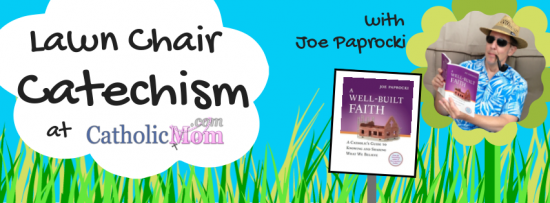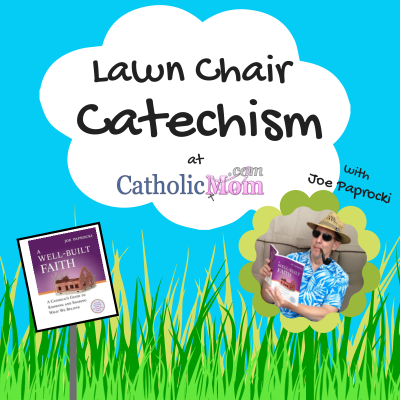Welcome to this summer’s Lawn Chair Catechism! We're reading Joe Paprocki’s best-selling book, A Well-Built Faith: A Catholic’s Guide to Knowing and Sharing What We Believe. We’re taking it one chapter at a time all summer long.

When Jesus reveals the Father to us, we may not be sure of what to say or how to talk with him. Luckily, Jesus gave us some very specific suggestions on how we can talk to God, our Father.
We talk with our friends about everyday life experiences: ups and downs, successes and failures, plans, dreams, hopes, frus- trations, and so on. One of the greatest teachers of prayer, Saint Ignatius of Loyola, encouraged his followers to pray to God as one friend talking to another. We can and should pray to God in this way. When we cannot find our own words to pray, however, or if we want to pray together with someone else, we can turn to the words that Jesus taught us in the Lord’s Prayer.
Consider the seven petitions in the Our Father:
- Hallowed be thy name
- Thy kingdom come
- They will be done on earth as it is in heaven
- Give us this day our daily bread
- Forgive us our trespasses as we forgive those who trespass against us
- Lead us not into temptation
- Deliver us from evil
So what difference does it make that Catholics pray the Lord's Prayer? It means that we can pray to the One with whom we have an intimate relationship—God our Father. It means that we pray in the very words Jesus himself gave us. It means that we pray with confidence, knowing that our prayers are heard, and that in praying these words, we can more closely align ourselves with God, in whose image we are made and whose presence we seek.
Questions for Reflection and Discussion:
- What reasons can you think of that might drive a person to atheism—the belief that there is no God and that prayer is a waste of time?
- If we are not trying to change God’s mind in our prayer, why are we praying?
- When was a time in your life when you found it difficult to pray?
- When was a time in your life when praying the Lord’s Prayer was especially meaningful for you?
- What does it mean to say that the Lord’s Prayer is our own Declaration of DEpendence?
- Why are we encouraged to pray the Lord’s Prayer with confidence?
Feel free to comment on your own thoughts from this week's reading, your impressions and reflections, and/or your answers to these questions. You can also share your blog post by linking up below.
This is the final installment for this summer! For the complete archive of this summer's posts, visit the Lawn Chair Catechism page. (It will be archived and linked by next summer's Lawn Chair Catechism.)

[inlinkz_linkup id=449332 mode=1]
Copyright 2014 Sarah Reinhard
About the Author

Sarah Reinhard
When she’s not chasing kids, chugging coffee, or juggling work, Sarah Reinhard’s usually trying to stay up read just one … more … chapter. She writes and works in the midst of rural farm life with little ones underfoot. She is part of the team for the award-winning Catholic Mom’s Prayer Companion, as well as the author of a number of books.


.png?width=1806&height=731&name=CatholicMom_hcfm_logo1_pos_871c_2728c%20(002).png)
Comments